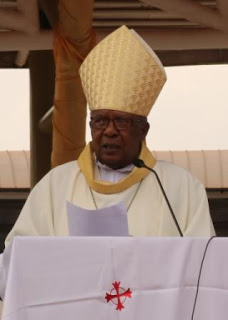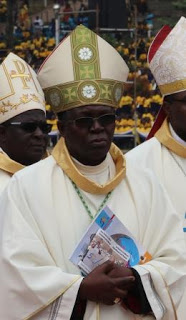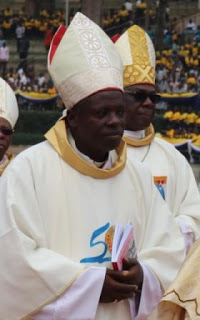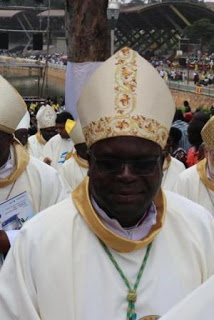UGANDA: Sentiments From AMECEA Delegates To SECAM 18th Plenary Assembly and Golden Jubilee Celebrations

H.E. John Cardinal Njue, Archbishop of Nairobi-Kenya Delivering the Bishops Statement At the SECAM 18th Plenary Assembly Closing Mass at Namugongo, Uganda Martyrs Shrine
The Symposium of Episcopal Conferences of Africa and Madagascar (SECAM) on Sunday, July 29, concluded the celebrations of its Golden Jubilee as well as its 18th Plenary Assembly, which were held in Kampala-Uganda under the theme, “Church Family of God in Africa, celebrate your jubilee, proclaim Jesus Christ your Saviour”.
Following their reflections and deliberations on various pastoral issues affecting the African continent, the Bishops indicated that the jubilee was a springboard towards new and holistic evangelization, geared towards addressing major issues the continent is grappling with.
The fifteen-points of commitment and exhortation, which were read in a statement at the closing ceremony of the event at Uganda Martyrs Shrine Namugongo in Kampala is part of a forthcoming Kampala document which will provide a broader perspective on the way forward for the mission of the Church in Africa. The document which will incorporate all the recommendations made during the deliberations is expected to be out by the end of the year.
AMECEA Bishops who were part of the team are looking forward to it so that they can begin to find ways of implementing them in the local context. The AMECEA Online News sort views of some of the Bishops who participated in the event and their feedback indicates satisfaction with the whole process, delight to be part of the process and great anticipation for the forthcoming Kampala Document.
Most Rev. Ignatius Chama, Archbishop of Kasama, Zambia, AMECEA Executive Board Member had this to say:

Archbishop of Kasama
Zambia and AMECEA
Executive Board Member
I give the organizers a big plus. Indeed, they put in a lot of efforts to make sure that we were comfortable where we were staying and that all the logistics were properly organized. I would also say to the Ugandan Episcopal Conference, ‘You have done a wonderful job.’
This was my first time to attend SECAM Plenary. Based on my observation, I would say that at the beginning, we did not managed time properly. This impacted on the last days when we became pressed for time and had to work extra-long to accomplish all the tasks. But I believe there could be a way of improving in the future.
As for the Statement that we issued during the closing ceremony, I believe we touched on a lot of issues that are happening in our various countries in terms of concerns of the people. In reference to my Archdiocese, I can associate with the message that was issued. A lot more that will come out soon in the final document and I believe that we have laid a foundation on which each one of us can build on as we move forward.
Most Rev. Gervas John Mwasikwabhila Nyaisonga, Archbishop of Mbeya, Tanzania and Chairman of Tanzania Episcopal Conference had this to say:

Archishop of Mbeya-Tanzania
And Chairman Tanzania
Episcopal Conference
From what I have seen and experienced from the meetings and the presentations, I can say that there was seriousness in the preparation. Of course, there is always room for improvement, for instance, the papers which were being presented could have been sent earlier to the participants to enable them prepare well in advance. Otherwise, all the other logistical services were great and we thank the Episcopal Conference of Uganda for a job well done.
Having a conference which unites all Catholic Bishops in Africa is something quite important as it facilitates the enhancement of unity among the Catholics in the whole continent. I therefore appreciate the nature and kind of this interaction.
Regarding the relevance of this meeting and the document which is yet to be released after the proposed amendments to our region AMECEA, my country Tanzania and to my Diocese, I would say yes everything is quite relevant. The Message that was communicated to the congregation at the closing ceremony is just a gist of what will feature in the main document, which will come later. What will finally come out as the ‘Kampala Document’ will be a rich resource of information, a lasting document that will give directive to our evangelization mission in Africa. I think the forum has given us a change to look back to the origins of SECAM, reflect on what we have done and achieved, and to focus on our future as a Church in Africa.
Rt. Rev. Bishop George Desmond Tambala, O.C.D., Bishop of Zomba Diocese, Malawi had this to say:

Bishop of Zomba-Malawi
The whole event was well organized. What struck me more was the centrality of the message. Although there have been so many activities such as presentations and discussions, we never lost the essence of the main theme of the event. Of course, the two aspects – the celebration of the Jubilee and the evaluation of the activities of the Church in Africa for the past 50 years, were both important.
SECAM operates in regions and to me it was a learning experience. The discussions have opened my eyes to the realities of each region and this is something that is very important. I would like to congratulate the moderators because they let people speak and express their views freely.
Concerning the pastoral situations in Africa, the message which we collectively came up with has encompassed and embraced all the realities as expressed during the meeting.
The political situations in African continent is one aspect that touches almost all the regions: the worrying trends of conflicting situations emanating from politics is something that could not be brushed aside. As a result, we committed ourselves to enhance collaboration with our political leaders and calling them to accountability so as to put the human and natural resources at the service of development, reconciliation, justice and peace.
Even though the message we gave out today may not bring out a road map in terms of elections and governance issues, the Kampala document which we are still working on will address these issues in greater depth. However, the whole overall look of SECAM has not been to despair despite the grim situations in our continent. As we heard from the preacher during the closing Mass at Namugongo, Bishop Sithembele Anton Sipuka of Umtata, South Africa, we should avoid two extreme: one would be to be too pessimistic about the African realities, and the other is to be too optimistic.
The issue of elections in Africa is a very dark side of our continent, which must be confronted courageously. We cannot go around this issue; we need to name it as it is.
∽End∽
By Pamela Adinda, AMECEA Online News


